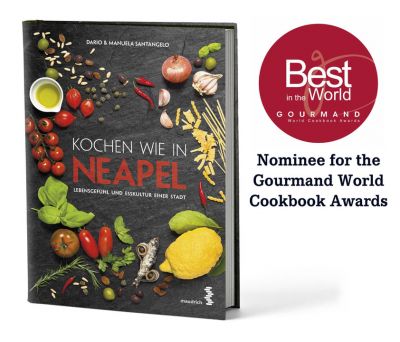Chefs Dario and Manuela Santangelo share their passion for Neapolitan cuisine and more in the heart of Europe.
Francesca Mignosa (FM): How and where was your passion for cooking born?
Dario Santangelo (DS): For me the theme of cooking and good food has always been important. I grew up in Naples, in a big family, where everyone competed for the title of best family cook. We used every opportunity to get together around the table to taste traditional dishes and simply be together. As I got older and after marrying Manuela...
Manuela Santangelo (MS): ...this year it’s already 30 years together...
DS: …yes, after the wedding, cooking was first a need to preserve the taste of the cuisine of my city since Manuela is Austrian and we live in Austria. Then it became a passion for the studies of history and popular culture. Both merged later into our books.
MS: In Austria, it is more the drinking that brings people together. But I have always loved sweets and my mother, my four sisters and I, have always had fun preparing delicious desserts. Also, the fantastic tradition of Viennese patisserie with its cakes and strudels is well-known to anyone who has traveled in Europe.
FM: How long have you been writing and publishing culinary books and publications?
DS: The adventure started eight years ago. Manuela and I are both graphic designers and I am also a professional photographer. At the time, I was working for a publishing house. It was the editorial director, a dear friend, who knew of my passion for cooking and proposed that we write our first book on Naples, the culture around the table and traditional recipes. Once I started working on it, it took only 10 months before "Neapel sehen und geniessen" (“See Naples and Then Enjoy It”) was born. The title was inspired by Goethe's famous phrase "see Naples and then die." I created the project in collaboration with my brother, Diego, who was the photographer. Manuela also collaborated by translating the book from Italian into German as well as being the inspiration for the section dedicated to desserts and, of course, supporting me throughout this adventure.
MS: With the second book, I took an active role in the research work as well as translating and providing all the sweet recipes. While Dario works on the savory recipes and photography, I handle the graphic design of the books. We already published another book on cooking with extra virgin olive oil. In addition to 90 recipes largely created by us, we have given great space to history. We narrated 5,000 years of history related to this product.
FM: You have been nominated for the Gourmand World Cookbook Shortlist Awards 2019, one of the most prestigious awards in the international culinary stage. How does that feel?
DS: Well, you can imagine the satisfaction. For several days the most frequent word we spoke was "WOW!" Being nominated for the Gourmand World Cookbooks Awards is already a victory. We are in the Italian cuisine section, which means that the 14 books nominated have been chosen from dozens and dozens of titles published each year on this theme all over the world.
MS: The winners will be announced in July at the award ceremony in Macau, China. We hope to be there, but even more to win. We just came back from Paris where we were invited by the founder of the Edouard Cointreau prize to participate in the Gourmand World Summit, a prelude to the July award. It was an extraordinary experience to see our book exhibited with the best books from the last three years at the UNESCO Headquarters in Paris. It was an important step to reach the goal that we gave ourselves for 2019: being able to publish our book in other languages. The very best from the international gastronomic publishing scene were present at the Summit.
FM: What types of recipes can we find in your latest book?
DS: A good part is traditional recipes like Gnocchi Alla Sorrentina, Cannelloni, Ravioli Alla Caprese, Pasta Alla Genovese, and invariably the king of Neapolitan cuisine the Sunday Ragù. We often revisit recipes with new cooking techniques. There are timeless dishes made lighter and more suitable for today's taste. For example, in some cases we have reduced the amount of fat used or we have given more structure to the dish by inserting different consistencies in the preparation or even deconstructing the original recipe. In other cases, we start from the most traditional ingredients of the Neapolitan tradition and present them in new combinations.
FM: In Vienna, you also offer several seminars and cooking classes.
DS: "Kochen wie in Neapel" is not just the title of the book, but the title of our cooking classes. In fact, the structure of the book reflects that of our courses; the first part dedicated to food history, popular culture, cooking techniques, product descriptions, and particular cooking tools. Then we move to the stove where each class covers one of the chapters from our book: Home-made pasta, Lemon-flavored cuisine, Pasta soups, Sunday lunch, Mamma what a Pizza, and more.
FM: Do Austrians love Italian cuisine? Do they appreciate international cuisine?
MS: Yes, generally Austrians love foreign cuisine. Like all German-speaking or Anglo-Saxon people, they have a taste and passion for all that they call exotic. The problem is, they may look at Italian or other cuisines in a stereotypical way which doesn’t allow them to be open to discovery. We work precisely on this. We try to connect people with the true culture of Italian cuisine. When we succeed, we are satisfied to see that those who discover true Italian cuisine do not want to go back.
For more information on Dario and Manuela: www.facebook.com/dario.manuela.santangelo/



